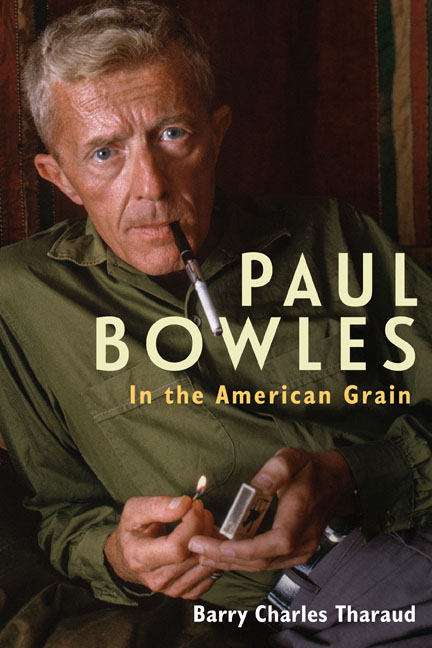Book contents
- Frontmatter
- Contents
- Preface
- Acknowledgments
- Abbreviations
- Introduction: Paul Bowles as a Canonical Writer
- 1 Paul Bowles on Intercultural Understanding: Too Far from Home
- 2 The Discovery of Existence: Without Stopping
- 3 Emersonian Shadows
- 4 Culture and Existence in Bowles’ Short Fiction
- 5 Gide and Bowles in North Africa: The Sheltering Sky
- 6 Language, Noise, Silence: Self and Society in Let It Come Down
- 7 The Spider’s House: The Social Construction of Reality
- 8 Existence and Imagination: Up Above the World
- 9 The Letters: In Touch
- Conclusion
- Bibliography
- Index
- Frontmatter
- Contents
- Preface
- Acknowledgments
- Abbreviations
- Introduction: Paul Bowles as a Canonical Writer
- 1 Paul Bowles on Intercultural Understanding: Too Far from Home
- 2 The Discovery of Existence: Without Stopping
- 3 Emersonian Shadows
- 4 Culture and Existence in Bowles’ Short Fiction
- 5 Gide and Bowles in North Africa: The Sheltering Sky
- 6 Language, Noise, Silence: Self and Society in Let It Come Down
- 7 The Spider’s House: The Social Construction of Reality
- 8 Existence and Imagination: Up Above the World
- 9 The Letters: In Touch
- Conclusion
- Bibliography
- Index
Summary
WE HAVE BEEN tracing a pattern in the works of Paul Bowles that runs from early to late, in which classic American transcendentalism and its derivative existentialism are the foundations for the stories, novels, autobiography, letters, and life. Such foundations include an important strain of moralism found in Emerson and Thoreau that is often hidden or latent in the works of Bowles but occasionally becomes surprisingly obvious and reiterates his ties to homegrown American traditions, despite his inveterate expatriate status. An important difference between Bowles and the American transcendentalists is that while Bowles portrays similar conflicts between existence and consciousness, culture and nature, and between the individual and society—in his works as well as in his own life—any positive view or hopefulness, if it exists at all, is at best—in Robert Frost's terms—“a diminished thing.” Although some readers perceive Bowles as a dark presence in American literature, or even, in Leslie Fiedler's terms, a “horror pornographer,” there is consonance with the darker perspectives in Hawthorne and Melville and, for astute readers, in Emerson and Thoreau as well—as in the Emerson of “Experience” in Essays: Second Series (1844), and “Fate” in The Conduct of Life (1860), or the Thoreau of Walden who occasionally reveals the existential failure in his own life project. However, for Bowles, as befits someone who lived through two world wars and numerous other conflicts around the world, darkness is the norm, and hope is mostly concealed. There are important reasons for this, including the historical context as well as the nature of life itself, both practical and philosophical. In short, Bowles plays on existential themes that one can find in Hawthorne (but without the solution of personal love in both the life and the works), and in Melville (in the conundrums of Moby Dick, The Confidence Man, The Encantadas, “Bartleby,” and other works).
I have tried to illuminate appropriate cultural and philosophical New England backgrounds in the works of Bowles, as found in Without Stopping and the letters, which are important and useful adjuncts to the stories and novels. In the process I became unwittingly drawn into the life itself, which, like the fiction, demonstrates existential patterns.
- Type
- Chapter
- Information
- Paul BowlesIn the American Grain, pp. 205 - 206Publisher: Boydell & BrewerPrint publication year: 2020

